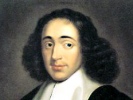
Sacred Texts Philosophy Spinoza Index Previous Next
Buy this Book at Amazon.com


Correspondence, by Benedict de Spinoza, [1883], at sacred-texts.com
Distinguished Sir,—Among your other merits spread abroad by fame, I understand that you have remarkable skill in optics. I have, therefore, wished to forward my essay, such as it is, to you, as I am not likely to find a better critic in this branch of learning. The paper, which I send you, and which I have styled "a note on advanced optics," has been published with the view of more conveniently making known my ideas to my friends and the curious in such matters. I hear that * * * * * is very clever in the same subject, doubtless he is well known to you. 1 If you could obtain for me his opinion and kind
attention, you would greatly increase my obligation to you. The paper explains itself.
I believe you have already received the "Prodromo" of Francis Lana 1 the Jesuit, written in Italian. Some remarkable observations on optics are contained in it. John Oltius too, a young Swiss very learned in these matters, has published "Physico-Mechanical Reflections concerning Vision;" in which he announces a machine for the polishing all kinds of glasses, very simple and of universal applicability, and also declares that he has discovered a means of collecting all the rays coming from different points of an object, so as to obtain an equal number of corresponding points, but only under conditions of a given distance and form of object. My proposal is, not that the rays from all points should be collected and re-arranged (this is with any object of distance impossible at the present stage of our knowledge); the result I aim at is the equal collection of rays from points outside the optic axis and in the optic axis, so that the apertures of glasses could be made of any size desired without impairing the distinctness of vision. But this must stand according to your skilled verdict. Farewell, and believe me, distinguished Sir, your obedient servant,
Godfrey Leibnitz,
J. U. D., Councillor of the Elector of Mainz.
Frankfort, 5 Oct., 1671 (new style).
370:1 Probably the name omitted is Diemerbroech, a learned physician and Cartesian at Utrecht.